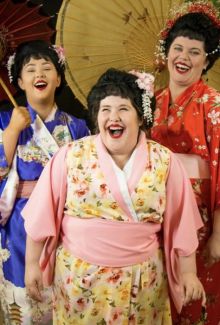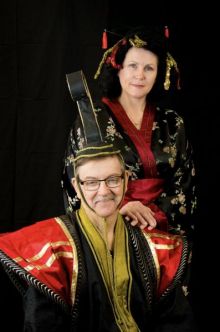The Mikado
Gilbert and Sullivan’s The Mikado: or, The Town of Titipu was first performed in London in 1885. This was Gilbert and Sullivan’s ninth collaboration and one of its most successful. Subsequently, it has proven to be one of the most popular and regularly performed of the Gilbert and Sullivan operettas. It is not difficult to see why. The wit, humour, and beautiful music is as charming and beguiling as it ever was, and performed with absolute relish and joy in this production by the Northern Light Theatre Company.
A young balladeer, Nanki-Poo (Benjamin Fleming) has come to Titpu in search of his beloved Yum-Yum (Dione Baker). However, Yum-Yum is betrothed to the new Lord High Executioner, Ko-Ko (Paul Briske). What is not initially know is that Nanki-Poo is actually the only son of great Mikado (Russell Ford), the Emperor of Japan. He has fled his father’s court as he set to marry Katisha (Sandy Wandel), and mature lady of the court. Katisha, however, has tracked Nanki-Poo down and demands he honour his commitment to her. How it all ends happily is a farcical delight.

The Northern Light Theatre Company has a developed a strong reputation for delivering top-notch productions as well as being a company that encourages and supports young theatre artists. The Mikado has been directed by one of these young Northern Light’s theatre artists, Nathan Quadrio, who with Musical Director Monique Warren have done a terrific job.
Special praise should go to Monique Warren as the singing and overall musicianship throughout the entire production was absolutely superb. There are so many musical highlights in the sumptuous score; highlights included Benjamin Franklin’s ‘A Wandering Minstrel, I’, Dione Baker’s ‘The Sun, Whose Rays’, and the divine ‘Madrigal’ sung by Dione Baker and Benjamin Franklin, with Amanda Sharp (Pitt-Sing) and Stephen Tulip (Pish-Tush). Also impressive and very moving was Sandy Wandel’s interpretations of Katisha’s mournful laments ‘The Hour of Gladness’ and ‘Alone, and yet Alive’.
The melancholic nature that is part of The Mikado prefigures other later works by Gilbert and Sullivan, notably The Yeoman of the Guard (1888). In The Mikado one of the most famous melancholic song is ‘Tit-Willow’ that Ko-Ko sings in his wooing of Katisha. In this production it was more played for laughs. Ko-Ko is conventionally played as a rather timid and small man. Paul Briske’s delightful Ko-Ko was neither timid nor small but rather bellicose and assertive. This worked rather well, especially in the wonderful duet with Sandy Wandel’s Katisha ‘There is Beauty in the Bellow of the Blast’.
 The one quibble I have with this otherwise terrific production is that unfortunately such relatively conventional interpretations of The Mikado, with an essentially ‘white’ cast playing Asian characters is now regarded as ‘yellow-washing’. Despite the joy I had watching this production and enjoying the commitment of the entire ensemble I could not get this issue of ‘yellow-washing’ out of my mind, especially as there were in the audience people of Asian ethnicity. The Mikado is just one amongst a number of popular operas, operettas, and musicals that are currently under this spot-light; others include, Madame Butterfly, Flower Drum Song,and Miss Saigon. It is a very complex matter but one that cannot be ignored by professionals as well as amateurs. If The Mikado is to continue to be performed (and I hope it does) then it must be interpreted in another more modern way.
The one quibble I have with this otherwise terrific production is that unfortunately such relatively conventional interpretations of The Mikado, with an essentially ‘white’ cast playing Asian characters is now regarded as ‘yellow-washing’. Despite the joy I had watching this production and enjoying the commitment of the entire ensemble I could not get this issue of ‘yellow-washing’ out of my mind, especially as there were in the audience people of Asian ethnicity. The Mikado is just one amongst a number of popular operas, operettas, and musicals that are currently under this spot-light; others include, Madame Butterfly, Flower Drum Song,and Miss Saigon. It is a very complex matter but one that cannot be ignored by professionals as well as amateurs. If The Mikado is to continue to be performed (and I hope it does) then it must be interpreted in another more modern way.
In 1987 Jonathan Miller showed a way with his English National Opera production featuring Monty Python’s Eric Idle. This was set in an Edwardian hotel lobby with the characters more associated with English ‘drawing room’ satire than the ‘Orientalism’ of classical Japan. That the creators of this production by the Northern Light Theatre Company may have been aware of this was evident in the modernised versions of Ko-Ko’s ‘I’ve Got a Little List’ and The Mikado’s ‘A more humane Mikado’, wonderfully and deliciously performed by Paul Briske and Russell Ford, respectively.
Congratulations to everyone involved in this production. Despite this reservation, nonetheless, I was like other members of the audience, clapping along and enjoying W.S. Gilbert’s wit, Sir Arthur Sullivan’s music and some truly excellent singing.
Tony Knight
Subscribe to our E-Newsletter, buy our latest print edition or find a Performing Arts book at Book Nook.

